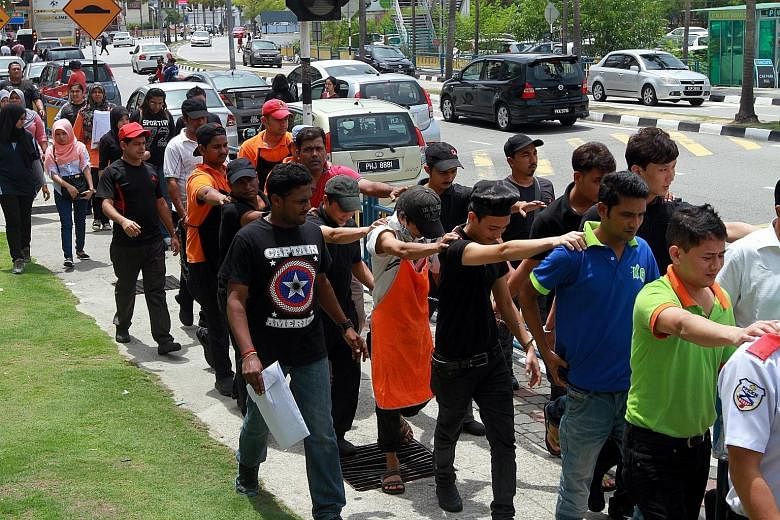The Malaysian government said yesterday that it will partially lift a ban on the hiring of low-skilled foreign workers, just two months after halting their intake.
Officials say employers will be allowed to bring in the migrant workers again after June if they can prove that they cannot find Malaysians for the job. This will be an easy hurdle for employers who hire blue-collar workers to do jobs shunned by most Malaysians.
"We have received requests from industry players in specific areas, such as the manufacturing industry," Datuk Seri Sakib Kusmi, director-general of the Immigration Department, told the New Straits Times yesterday.
"If we feel we have to hire them (foreigners), and if they (industry players) want to bring in foreign workers, they will have to prove that there is a need to do so."
His comments mark the coming end to the recruitment suspension of low-skilled migrants in some sectors, like manufacturing.
The freeze had come swiftly on the heels of public backlash which followed the government's announcement in February that it planned to bring in 1.5 million workers from Bangladesh.
The move to lift the hiring freeze reflects the love-hate relationship that Malaysian employers and the public have with foreign labour, rising and falling along with economic growth.
Malaysia has the fourth-largest number of foreign workers in East Asia-Pacific, according to a 2015 World Bank report.
Malaysian employers rely on these workers to assemble electronic parts in factories, pluck palm oil fruits in plantations, wait tables in coffee shops, construct buildings and provide security at housing estates.
Malaysia has 2.1 million legal migrants, and roughly two million more who are in the country without valid documents.
These workers - and their families - are mostly from Indonesia, Myanmar, Bangladesh and Nepal. Employers praise them for their willingness to do the so-called 3-D jobs - dirty, difficult and dangerous.
"We are willing to hire locals over foreigners, but it's the Malaysians who aren't interested," said Mr Noorul Hassan, head of the Malaysian Muslim Restaurant Owners Association. It is a typical complaint among employers.
A survey by the Federation of Malaysia Manufacturers last month found 84 per cent of its members facing a manpower shortage, with half unable to fulfil existing orders, according to a report by The Star daily. Most of its members depend on a regular fresh supply of foreign labour as those with expired work permits return home.
But while employers sing praises of the workers, officials warn that the addiction to cheap labour is bad for the economy in the long term.
By introducing the hiring freeze, the government had been hoping to appease Malaysians unhappy with the higher cost of living and with employers who refuse to hire them as foreign labour is cheaper.
"Manufacturing is one of the sectors which is already 80 to 90 per cent foreign labour. If we allow more foreign workers, then what is the value-add for us?" Deputy Home Minister Nur Jazlan Mohamed told The Straits Times.
The central bank, Bank Negara Malaysia, in a Cabinet briefing two months ago also sounded an alarm on the country's heavy reliance on foreign labour.
The total number of imported labourers - legal and illegal - has exceeded the government's self-imposed limit of 15 per cent of the workforce. Legal migrants alone made up 15 per cent of the 15.5 million workforce last year.
Mr Abdullah Sani Abdul Hamid, acting president of the Malaysian Trades Union Congress, said: "The problem is companies propose bringing in workers but do they really need that many of them?"
•Additional reporting by Shannon Teoh

